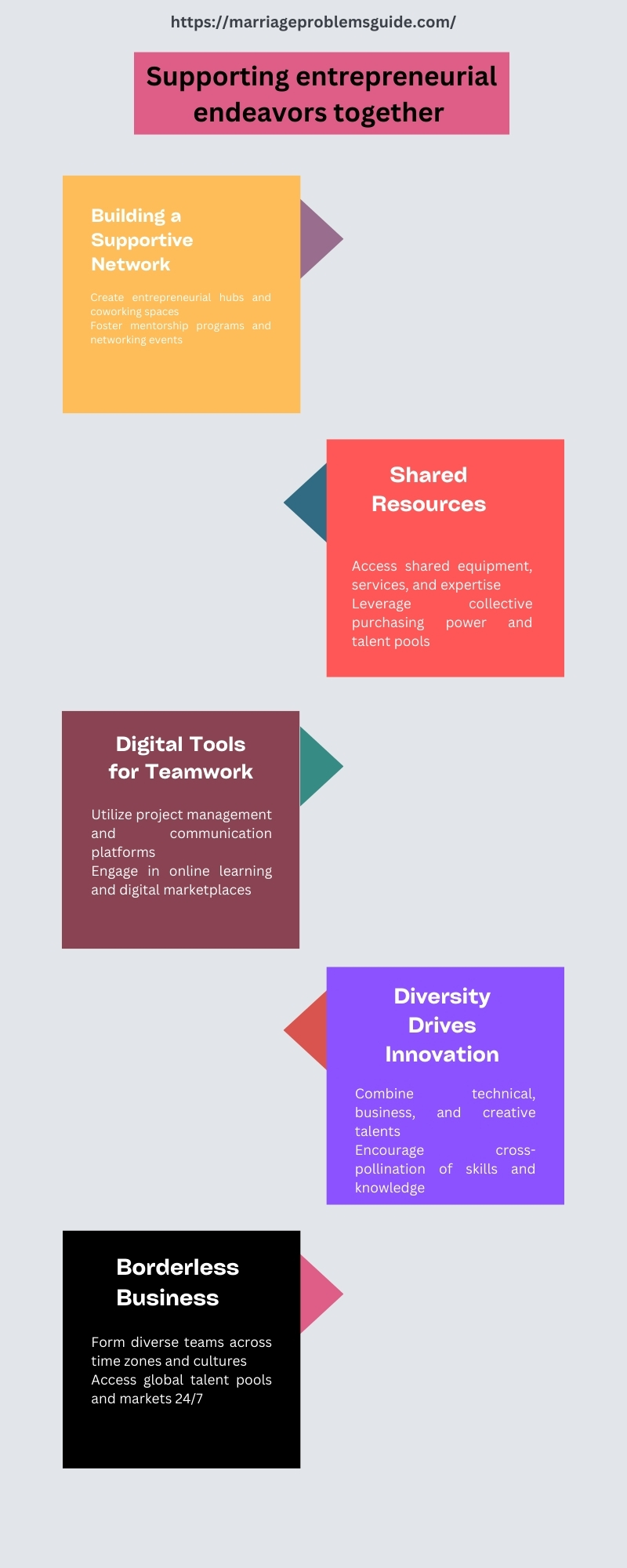In today’s rapidly evolving business landscape, supporting entrepreneurial endeavors has become more crucial than ever. By fostering a collaborative environment where entrepreneurs can thrive, we create opportunities for innovation, economic growth, and societal progress.
In this blog post, we’ll explores the various ways we can come together to support entrepreneurs and build a robust ecosystem that nurtures success.
The Importance of Supporting Entrepreneurship
Before delving into the strategies for support, let’s understand why entrepreneurship is so vital:
- Drives economic growth and job creation
- Fosters innovation and technological advancement
- Addresses societal needs and challenges
- Promotes diversity and inclusion in the business world
- Encourages personal and professional development

By supporting entrepreneurs, we invest in the future of our communities and economies.
Key Stakeholders in the Entrepreneurial Ecosystem
Creating a thriving entrepreneurial environment requires the involvement of various stakeholders:
- Entrepreneurs
- Investors and venture capitalists
- Government agencies
- Educational institutions
- Incubators and accelerators
- Mentors and advisors
- Corporate partners
- Local communities
Each of these groups plays a unique role in supporting entrepreneurial endeavors.
Strategies for Supporting Entrepreneurs
1. Access to Funding
One of the most critical aspects of supporting entrepreneurs is ensuring access to capital:
- Develop diverse funding options (grants, loans, equity investments)
- Create pitch competitions and funding events
- Establish connections between entrepreneurs and potential investors
- Promote crowdfunding platforms and initiatives
2. Mentorship and Guidance
Experienced mentors can provide invaluable support to new entrepreneurs:
- Establish mentorship programs pairing seasoned professionals with startups
- Organize regular networking events for knowledge sharing
- Create online platforms for virtual mentoring sessions
- Encourage retired executives to become mentors
3. Education and Skill Development
Equipping entrepreneurs with the right skills is crucial for their success:
- Offer entrepreneurship courses in schools and universities
- Provide workshops on business planning, marketing, and finance
- Develop online learning resources and webinars
- Collaborate with industry experts to deliver specialized training
4. Incubators and Accelerators
These programs provide comprehensive support for early-stage startups:
- Establish local incubators with shared workspace and resources
- Create industry-specific accelerator programs
- Offer a mix of virtual and physical incubation options
- Provide access to professional services (legal, accounting, marketing)
5. Networking Opportunities
Building connections is essential for entrepreneurial growth:
- Organize regular networking events and meetups
- Create online communities and forums for entrepreneurs
- Facilitate introductions between startups and potential partners or clients
- Host industry-specific conferences and trade shows
6. Government Support and Policy
Favorable policies can significantly impact the entrepreneurial ecosystem:
- Implement tax incentives for startups and small businesses
- Streamline business registration and licensing processes
- Develop grants and funding programs for innovative ventures
- Create special economic zones or innovation districts
7. Corporate Partnerships
Established companies can play a crucial role in supporting startups:
- Establish corporate venture funds to invest in promising startups
- Create partnership programs between corporates and startups
- Offer resources and expertise to early-stage companies
- Provide market access and customer introductions
8. Infrastructure and Resources
Providing the necessary infrastructure can help entrepreneurs focus on growth:
- Develop coworking spaces and innovation hubs
- Ensure access to high-speed internet and technology resources
- Create maker spaces and prototyping facilities
- Establish shared services for administrative tasks
Building a Collaborative Entrepreneurial Ecosystem
To truly support entrepreneurial endeavors together, we need to foster a collaborative ecosystem. Here are key steps to achieve this:
- Encourage open communication and knowledge sharing
- Promote a culture of collaboration over competition
- Develop cross-sector partnerships and initiatives
- Create platforms for ongoing dialogue between stakeholders
- Celebrate and showcase entrepreneurial successes
- Address challenges and failures openly to promote learning
The Role of Technology in Supporting Entrepreneurs
Technology plays a crucial role in modern entrepreneurship support:
Digital Platforms
- Online learning management systems for education
- Virtual mentoring and coaching platforms
- Digital marketplaces for connecting startups with resources
- Crowdfunding and online investment platforms
Data Analytics
- Market research and trend analysis tools
- Performance tracking and benchmarking systems
- Predictive analytics for business planning
Artificial Intelligence
- AI-powered chatbots for customer service and support
- Machine learning algorithms for personalized mentoring
- Automated business planning and financial forecasting tools
Blockchain
- Secure and transparent fundraising mechanisms
- Smart contracts for business agreements
- Decentralized networks for resource sharing
Measuring the Impact of Entrepreneurial Support
To ensure the effectiveness of support initiatives, it’s crucial to measure their impact:
Key Performance Indicators (KPIs)
- Number of new businesses started
- Survival rate of supported startups
- Job creation and economic impact
- Innovation metrics (patents, new products/services)
- Funding secured by supported entrepreneurs
Qualitative Assessments
- Entrepreneur satisfaction surveys
- Case studies of successful ventures
- Testimonials from mentors and partners
- Community impact assessments
Challenges in Supporting Entrepreneurship
While supporting entrepreneurial endeavors is crucial, it comes with its own set of challenges:
- Ensuring equitable access to resources and opportunities
- Balancing support with promoting self-reliance
- Addressing the high failure rate of startups
- Keeping up with rapidly changing technology and market trends
- Maintaining long-term commitment from stakeholders
- Navigating regulatory and legal complexities
Addressing these challenges requires ongoing collaboration and adaptability.
Success Stories: The Power of Collective Support
To illustrate the impact of collaborative support, let’s look at some success stories:
Case Study 1: Tech Startup Accelerator
A partnership between a university, local government, and tech companies resulted in a successful accelerator program:
- Provided funding, mentorship, and resources to 50 startups over 3 years
- 70% of participants secured additional funding post-program
- Created over 500 new jobs in the local economy
Case Study 2: Rural Entrepreneurship Initiative
A collaborative effort to support rural entrepreneurs yielded impressive results:
- Established 10 community-based incubators in rural areas
- Provided training to over 1,000 aspiring entrepreneurs
- Resulted in the launch of 200 new small businesses
Case Study 3: Corporate-Startup Partnership Program
A large corporation’s initiative to partner with startups led to mutual benefits:
- Invested in 30 startups over 5 years
- Integrated innovative solutions from startups into corporate operations
- Resulted in significant revenue growth for both parties
The Future of Entrepreneurial Support
As we look to the future, several trends are shaping the landscape of entrepreneurial support:
- Increased focus on social and environmental impact
- Growth of remote and distributed entrepreneurship
- Integration of emerging technologies (AI, VR, IoT) in support programs
- Emphasis on diversity, equity, and inclusion in entrepreneurship
- Rise of global entrepreneurial networks and collaborations
Adapting to these trends will be crucial for continued success in supporting entrepreneurs.
Comparative Analysis: Traditional vs. Collaborative Support Models
To understand the benefits of a collaborative approach, let’s compare traditional and collaborative support models:
| Aspect | Traditional Support Model | Collaborative Support Model |
|---|---|---|
| Resource Access | Limited to individual organizations | Pooled resources from multiple stakeholders |
| Mentorship | Often one-dimensional | Diverse mentors from various backgrounds |
| Networking | Limited to specific circles | Expansive, cross-sector networking |
| Funding | Typically from single sources | Multiple funding avenues and options |
| Innovation | Siloed within industries | Cross-pollination of ideas across sectors |
| Scalability | Often constrained by individual capacity | Leverages collective capabilities for growth |
| Impact | Localized and specific | Broader economic and social impact |
Conclusion: Empowering Entrepreneurs Through Collective Action
Supporting entrepreneurial endeavors together is not just a noble goal; it’s a necessity for driving innovation, economic growth, and societal progress.
By fostering a collaborative ecosystem that brings together diverse stakeholders, we can create an environment where entrepreneurs thrive and succeed.
Key takeaways from this exploration include:
- The critical importance of a multi-faceted approach to entrepreneurial support
- The need for ongoing collaboration between various stakeholders
- The role of technology in enhancing support mechanisms
- The importance of measuring impact and addressing challenges
- The power of collective action in creating success stories
As we move forward, let’s commit to:
- Actively participating in entrepreneurial support initiatives
- Sharing knowledge and resources openly
- Embracing diversity and inclusivity in entrepreneurship
- Continuously adapting to changing needs and trends
- Celebrating and learning from both successes and failures
By working together to support entrepreneurial endeavors, we not only help individual entrepreneurs succeed but also contribute to building stronger, more resilient economies and communities.
Let’s embrace this collective responsibility and create a future where entrepreneurial spirit flourishes, driving innovation and positive change across the globe.
Remember, every small effort in supporting an entrepreneur can lead to significant impacts. Whether you’re a seasoned business leader, an investor, a policymaker, or simply someone passionate about innovation, your contribution matters.
Together, we can build a world where entrepreneurial dreams become reality, shaping a brighter future for all.











